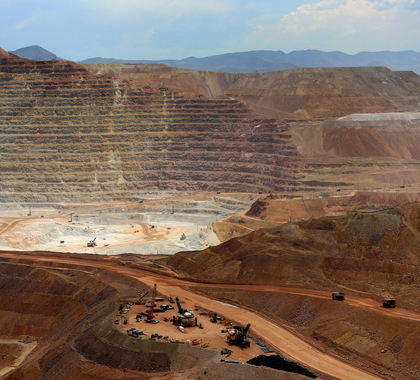The Idaho Falls District Office of the U.S. Bureau of Land Management (BLM) approved the Caldwell Canyon Mine Project, an open pit phosphate mine in Caribou County in southeastern Idaho.
The plan includes two open pits covering about 1,200 acres. Most of the mine site will be on private land. The pits will extend onto approximately 140 acres of BLM land, and 200 acres are on Idaho endowment land. State officials have already approved the lease on the state’s portion of the proposed site.
Saving Jobs, Preventing Pollution
The BLM’s approval of the project saves the jobs of 185 miners who otherwise would soon be out of work when the nearby Blackfoot Bridge Mine runs out of phosphate ore. P4 says its new mine will also preserve 585 jobs at its phosphate processing plant in nearby Soda Springs for the 40-year life of the mine.
P4 estimates the mine will generate more than $47 million annually in payroll, taxes, royalties, and purchases, in addition to supporting other jobs in the surrounding communities.
The approved plan requires P4 Production, a subsidiary of Bayer, which requested the permits to develop three phosphate leases, to place specific types of cover beneath and over the mine waste rock to prevent water pollution.
Selenium, a byproduct of phosphate mining, is toxic in high doses. In 1997, sheep and horses eating selenium-laden plants growing near phosphate mine waste dumps died. To avoid such outcomes from this project, the BLM is requiring P4 to line its pits with geomembrane, backfill them, and cap the site upon completion of mining.
Useful Commodity
Phosphate is a key ingredient in many fertilizers, and more than 90 percent of the phosphate mined is used in fertilizer manufacture. Other uses of phosphate include animal feed and detergents.
China and Morocco lead the world in phosphate production. The United States is the world’s third-largest producer, mining 27.5 million metric tons of marketable phosphate rock, valued at $2.2 billion, in 2015. Idaho is the nation’s third-leading domestic producer of phosphate, trailing only Florida and North Carolina.
From the 1960s through the 1990s, the United States exported phosphate, but since 1996 America has been a net importer. Imports accounted for about 12 percent of domestic use in 2015.
Happy to Help
In a BLM press release announcing the decision, William Perry Pendley, BLM’s deputy director of policy and programs, said the agency was pleased to be able to contribute to the region’s economy.
“The Caldwell Canyon Mine is a vital part of the Idaho economy,” said Pendley. “This project’s approval means decades of additional job security and economic development for communities in the surrounding area, and the BLM is proud to play a part in sustaining those benefits.”
Idaho’s two U.S. senators praised the Trump administration for working with state and local officials to keep mining alive in the region.
“On-the-ground support from Idaho stakeholders in collaboration with local BLM officials will ensure a thorough process that strikes a balance between resource extraction and conservation efforts,” Sen. Mike Crapo (R-ID) said in a press release.
“The Caldwell Canyon mine is an excellent example of how improved approval processes can facilitate better use of natural resources and stimulate economic development in our communities,” said Sen. Jim Risch (R-ID) in the same press release.
The Idaho Conservation League, an environmental watchdog group, said it was pleased P4 incorporated in its proposal some of its ideas to minimize environmental impacts from mining, including avoiding building roads in sensitive habitat and taking precautions to protect water quality.
Protecting Rural Jobs
P4’s mine will help the region maintain a varied and vibrant economic base, says Fred Birnbaum, vice president at the Idaho Freedom Foundation.
“Mining and resource-based industries are important both to rural Idahoans and the state generally in terms of good-paying jobs and maintaining a broad economic base,” Birnbaum said.
Benjamin Davenport, executive vice president of the Idaho Mining Association, agrees BLM’s decision is good news for Idaho.
“Mining is very significant to our rural economies in Idaho, creating close to 3,000 direct, high-paying jobs in very rural parts of our state with few other employment opportunities,” Davenport said. “This does not include the indirect jobs that support the industry in these parts of our state.
“In a rapidly urbanizing state with less than two million people, it is important to protect jobs in small towns,” Davenport said.
Duggan Flanakin ([email protected]) writes from Austin, Texas.
Official Connections:
Sen. Mike Crapo (R-ID): https://www.crapo.senate.gov/; https://www.crapo.senate.gov/contact/email-me
Sen. Jim Risch (R-ID): https://www.risch.senate.gov/public/; https://www.risch.senate.gov/public/index.cfm/email




